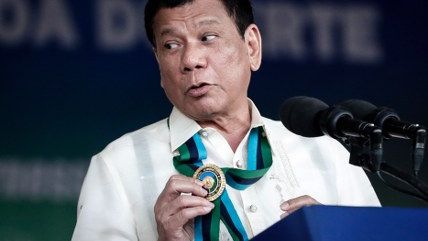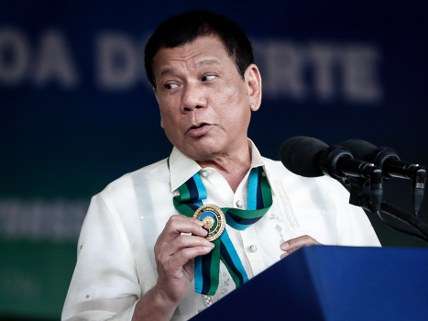Around the World, Tyrants Ascendant
Leaders crack down on their own citizenry.


John McCain is fond of saying, "It's always darkest just before it goes totally black." According to a February report by Amnesty International, human rights "reached a nadir" in 2015. Not quite. The past 12 months prove that even when you hit bottom, there is always room to sink.
Few recent years have been so unrelievedly grim when it comes to freedom and democracy as 2016. Retreat from the values of human liberty and dignity was the norm. The bleak trend blanketed the globe like volcanic ash.
Rare was the country showing progress. Even the United States succumbed to illiberal impulses—electing a president who takes leadership lessons from Vladimir Putin and Saddam Hussein, praises torture, wants to curb press freedom, and endorses surveillance of "Muslim neighborhoods."
The government of China carried out a campaign against internal enemies, arresting hundreds of people to punish even the mildest dissent. "As an old-timer who's been studying China since the Mao era, I have to say it's the worst I've seen since then," University of California, San Diego scholar Susan Shirk told the Los Angeles Times.
In Russia, President Vladimir Putin continued "a sweeping crackdown to silence critical voices that has included new legal restrictions on the internet, on freedom of expression, on the rights of lesbian, gay, bisexual and transgender (LGBT) people, and on other fundamental freedoms," reported Human Rights Watch.
The CIA and FBI concluded that the Kremlin interfered in the American presidential election to help the Republican nominee. A Russian state TV news anchor exulted that "'democracy' and 'human rights' are absent from Donald Trump's lexicon."
Those terms are also not favorites of Putin's ally Bashar Assad. The Syrian despot invited prosecution for crimes against humanity in his waging of civil war, culminating in a murderous siege of the city of Aleppo. With hospitals inundated, a medical administrator told The Wall Street Journal, "death is a thousand times more merciful than being wounded."
After surviving an attempted coup, Turkish President Recep Tayyip Erdogan's government arrested dozens of Kurdish mayors and silenced every independent Kurdish news outlet—even though the people blamed for the plot are enemies of the Kurds. Turkey now has more journalists behind bars than any other country, double the number in runner-up China.
In Egypt, hundreds of suspected dissidents vanished through "enforced disappearance," which involves secret imprisonment without trial and sometimes torture. Saudi Arabia opened the new year by beheading 47 prisoners on terrorism charges, though a poet given the same sentence for apostasy had his punishment generously reduced to eight years in prison and 800 lashes. Tunisia retained its status as the sole democracy in the Arab world.
Elected president of the Philippines in June, Rodrigo Duterte mounted an anti-drug campaign in which more than 6,000 people have been killed by police and vigilantes—an average of 36 every day he's been in office. He bragged that as mayor of Davao City, he personally executed three criminal suspects on the street.
Poland's Supreme Court ruled that a new law to restrict public demonstrations was unconstitutional. Legendary Solidarity leader Lech Walesa, who helped liberate the country from communism, accused the right-wing government of destroying everything he fought for.
Gambian President Yahya Jammeh, who has ruled for 22 years and once promised to rule for a billion, lost an election and agreed to step down, before changing his mind. Joseph Kabila, barred from running for a third term in the Democratic Republic of Congo, insisted on staying on after his term expired, finally agreeing to leave at the end of 2017.
Robert Mugabe, who has held power in Zimbabwe since 1980, announced he will run for re-election in 2018—for a term that would end after his 99th birthday. But Ghana, an exemplary African democracy, carried out its third peaceful transfer of power since 1992.
Cuba's Fidel Castro died at 90, but the persecution of dissent has continued under brother Raul. Venezuela's leftist regime, presiding over economic chaos, blocked a referendum that could have removed President Nicolas Maduro, who rules by decree. Said Venezuelan political scientist Maria Teresa Romero, a critic of Maduro's, "The golden age of socialism in the 21st century is over in South America."
The golden age of democracy, when dictators were falling and freedom was on the march, likewise appears to have ended. In 2016, the world marked another year in an age of lead.
© Copyright 2016 by Creators Syndicate Inc.


Show Comments (256)